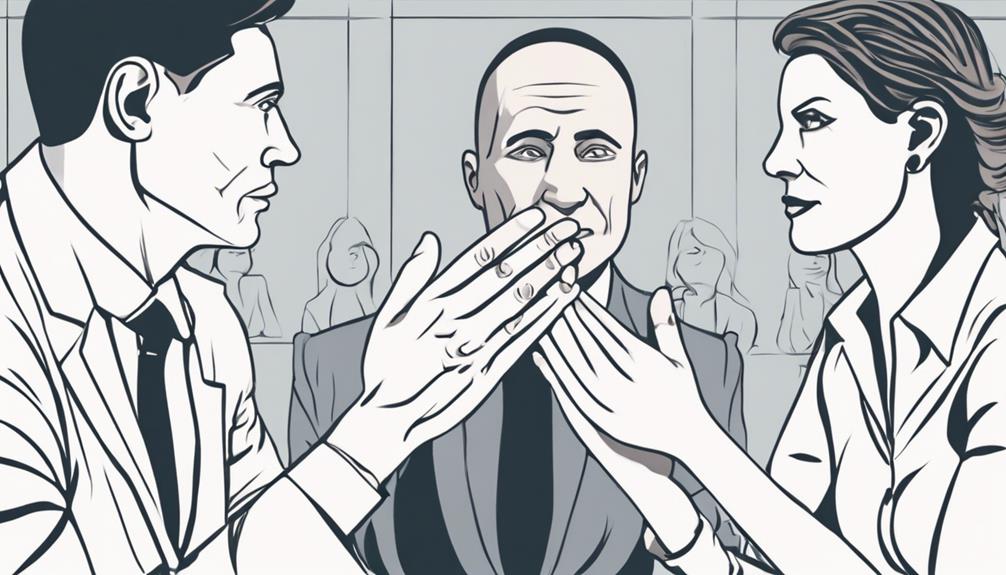Ethical guidelines for hypnotists encompass maintaining integrity, confidentiality, and client well-being. Upholding professional behavior, respecting client autonomy, and obtaining informed consent are crucial. Clear boundaries, confidentiality, and competence are key for a safe therapeutic space. Hypnotists' adherence to ethical standards and continuous training ensure high-quality care. The comprehensive code of ethics in hypnotherapy sets the foundation for ethical practice.
Code of Ethics

Within the field of hypnotherapy, establishing a clear and comprehensive code of ethics is essential to ensure the ethical practice of hypnotists and the protection of clients' well-being. Ethical standards serve as a foundation for the profession, guiding practitioners in their responsibilities towards clients and the broader community. These standards outline the expectations and boundaries for professional behavior, ensuring that hypnotists uphold integrity, confidentiality, and respect in their interactions with clients.
Practitioner responsibilities outlined in ethical guidelines include obtaining informed consent from clients before any hypnotherapy sessions, maintaining client confidentiality, and refraining from exploiting the client-practitioner relationship for personal gain. Hypnotists are also expected to continuously improve their skills and knowledge through ongoing education and training to provide the highest quality of care to clients.
Client Confidentiality
Establishing and maintaining client confidentiality is a fundamental ethical principle that hypnotists must rigorously uphold in their practice. Hypnotists have ethical obligations to protect the privacy of their clients by ensuring that any information disclosed during sessions remains confidential.
Client confidentiality is crucial for building trust and fostering a safe therapeutic environment where individuals feel comfortable sharing their thoughts, feelings, and experiences without fear of judgment or breach of privacy.
Hypnotists must adhere to strict guidelines regarding client confidentiality, refraining from disclosing any information shared during sessions to third parties without explicit consent from the client. This commitment to privacy protection extends to all forms of communication, including written records, electronic data, and verbal discussions.
It is essential for hypnotists to prioritize the confidentiality of client information to maintain professional integrity and uphold ethical standards in their practice.
Informed Consent
Prior to initiating any hypnotic session, it is imperative for hypnotists to obtain informed consent from their clients. Informed consent entails ensuring that the client fully understands the nature of hypnosis, the purpose of the session, and the potential outcomes. This process involves providing relevant information about the hypnotic techniques to be used, the expected benefits, any potential risks or side effects, and the client's rights during the session.
From a legal standpoint, obtaining informed consent is crucial for protecting both the client and the hypnotist. It serves as a form of documentation that demonstrates the client was made aware of what the session would entail and agreed to participate voluntarily.
Failing to obtain informed consent can lead to ethical issues, legal repercussions, and a breach of trust between the hypnotist and the client. Therefore, ensuring that clients have a clear understanding of the hypnotic process and willingly consent to it is fundamental to maintaining ethical standards and professional integrity in hypnotic practice.
Boundaries and Relationships
Maintaining clear boundaries and fostering professional relationships are paramount considerations for hypnotists in their practice. Ethical boundaries serve as the foundation for a safe and effective therapeutic environment. Hypnotists must establish guidelines that outline the scope of the therapeutic relationship, ensuring that interactions remain within the realm of professional conduct. By clearly defining these boundaries, hypnotists can uphold ethical standards and protect the well-being of their clients.
In addition to ethical boundaries, building a strong therapeutic rapport is essential for the success of hypnotherapy sessions. Developing a trusting and respectful relationship with clients can enhance the effectiveness of hypnotic interventions and contribute to positive outcomes.
Hypnotists should prioritize open communication, empathy, and sensitivity to client needs to establish a rapport built on mutual trust and understanding.
Competence and Training

A solid foundation of knowledge, skills, and ongoing professional development is essential for hypnotists to demonstrate competence in their practice. Hypnotists should meet certification requirements to ensure they have acquired the necessary training and education to safely and effectively practice hypnosis.
Practical experience is equally vital, as it allows hypnotists to hone their skills and apply theoretical knowledge in real-world settings.
Furthermore, hypnotists must engage in ongoing education to stay current with the latest advancements and best practices in the field. This continuous learning not only enhances their competence but also demonstrates a commitment to providing quality care to clients.
Specialized techniques, such as regression therapy or pain management, may require additional training to ensure proficiency and ethical application.
Professional Behavior
Adhering to a code of professional conduct is paramount for hypnotists to uphold ethical standards in their practice. Maintaining ethical boundaries ensures the safety and well-being of clients during hypnosis sessions. Hypnotists must conduct themselves ethically by respecting client confidentiality, informed consent, and the principle of non-maleficence.
Professional behavior in hypnosis involves establishing clear boundaries with clients to prevent any form of exploitation or harm. Hypnotists should refrain from engaging in dual relationships with clients to maintain objectivity and prevent conflicts of interest. It is crucial for hypnotists to prioritize the best interests of their clients above all else.
Ethical conduct also includes ongoing professional development and supervision to enhance skills, stay updated on ethical guidelines, and seek guidance when faced with challenging ethical dilemmas.
Respect for Client Autonomy

The ethical practice of hypnosis necessitates a profound respect for the autonomy of clients undergoing hypnosis therapy. Client autonomy refers to the fundamental right of individuals to make their own decisions regarding their treatment and well-being.
In the context of hypnosis, respecting client autonomy involves empowering clients to actively participate in the therapeutic process, make informed choices, and provide consent for the hypnotic interventions.
Client empowerment is a crucial aspect of promoting autonomy during hypnosis sessions. Hypnotists should prioritize building a collaborative and respectful relationship with clients, where the clients feel empowered to express their preferences, concerns, and boundaries. By fostering open communication and involving clients in the decision-making process, hypnotists can ensure that the therapy aligns with the client's values and goals.
Furthermore, ethical decision-making in hypnosis revolves around upholding the principles of beneficence and non-maleficence while respecting client autonomy. Hypnotists must make decisions that prioritize the well-being and best interests of the client, while also honoring the client's right to self-determination.
Frequently Asked Questions
Can Hypnotists Guarantee Specific Results for Clients?
Hypnotists cannot guarantee specific results for clients due to varied client expectations, ethical considerations, and the complexity of human behavior. Maintaining professional boundaries and being transparent about success rates is crucial in managing client expectations.
Are There Age Restrictions for Clients Seeking Hypnosis?
Clients seeking hypnosis may be subject to age restrictions, requiring parental consent for minors. Informed consent is essential for all clients, ensuring they understand the process and potential outcomes of hypnosis sessions before proceeding with treatment.
How Do Hypnotists Handle Clients With Pre-Existing Mental Health Conditions?
Hypnotists approach clients with pre-existing mental health conditions by implementing safety measures, such as assessing suitability for hypnosis and collaborating with mental health professionals. Upholding professional boundaries and ethics is crucial to ensure client well-being.
Can Clients Request Recordings of Their Hypnosis Sessions?
Clients may request recordings of hypnosis sessions for personal use or review. However, hypnotists must consider privacy concerns and legal implications. Ensuring consent, confidentiality, and data protection are vital to maintaining ethical standards in such situations.
What Happens if a Client Has a Negative Experience During Hypnosis?
In the event of a client experiencing a negative outcome during hypnosis, it is imperative for hypnotists to prioritize client support. Ethical responsibility dictates immediate assessment, debriefing, and referral to appropriate mental health professionals if needed.
Conclusion
In conclusion, adherence to ethical guidelines is paramount for hypnotists to ensure the well-being and autonomy of their clients. By upholding principles such as client confidentiality, informed consent, boundaries, competence, and professional behavior, hypnotists can establish trust and maintain the integrity of their practice.
It is essential for hypnotists to prioritize ethical considerations in their work to safeguard the interests and rights of those they serve.


